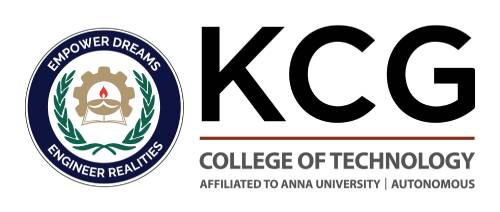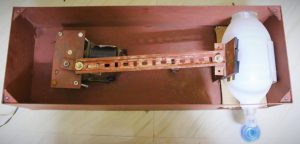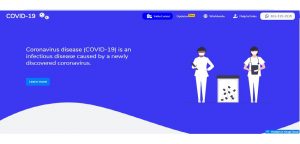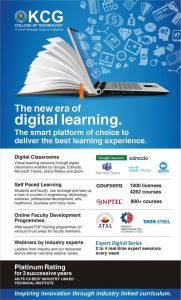The Way Forward during the Pandemic
While it is too early to assess the impact caused by the pandemic Covid 19, there are signs that it will permanently change the way we function, whether it is our personal lives or how we discharge our professional responsibilities. As one expert commented, “COVID-19 will leave an enormous impact on how we consume, how we learn, how we work, and how we socialize and communicate.”
Faced with an unprecedented crisis and a month-long lockdown, for an educational institution like KCG College of Technology, the immediate priority was to support our students who were cut away from the campus and isolated in their homes. It was crucial that we offer academic support as well as inspire the students to keep physically and mentally fit. Dr. Maria van Kerhkove of WHO said “There’s no lockdown on laughter; there’s no lockdown on talking to your family and finding ways to connect.” To take that one step further, we decided there is no lockdown on connecting with students and colleagues online while ensuring that everyone stayed safe. KCG College of Technology rose to the challenge by immediately adopting a number of well thought out strategies.
Creating Digital Content
Academic support was the first challenge, as students were confined to their homes with only phones and computers to connect with each other. Digital content and streaming online was clearly the way forward. Through Google Classrooms and Edmodo, students were given access to their course materials and assignments. Videos on topics mandated by the curriculum and regular quizzes provided intellectual stimulation and ensured interest in studies. Online workshops were meticulously planned and offered on mobile app development, web apps, programming, and innovation. The College also signed up with Coursera for 2000 licenses (https://www.coursera.org/) and both faculty and students were given individual licenses to do certification courses of various Top Foreign Universities and Industries. Various other Certificate Courses offered by Tata Steel (http://www.capabilitydevelopment.org/) and other Industries, IITs, MHRD-MIC (https://www.mic.gov.in/iflts_upcoming.php) and NPTEL (https://nptel.ac.in/) ensured that faculty and students would use the lockdown to learn new skills.
Many of our alumni studying abroad managed to return but we still had alumni stuck in UK, France, Italy, Spain, Canada, Netherlands, Australia, and different parts of US. The college reached out to them and it was reassuring to know that they were safe. Alumni also came forward to take short webinars for current students as part of Digital Series 2020 on their area of expertise, ranging from CAD and CATIA to Artificial Intelligence (https://kcgcollege.ac.in/about/digital_series/).
Ensuring Inclusivity
One of the very real issues when shifting to digital content is that those who are disadvantaged or settled in remote rural areas are likely to have less internet connectivity, leaving them ill-informed and vulnerable. These students might find themselves unable to participate in online courses. Every faculty took it upon themselves to ensure that no one was left out, that every student had access to the materials being posted online. The students were called personally, and enquired regarding their general well-being. After understanding the network issues, they were facing, classmates as well as system admins from the campus helped the students access the material. Where necessary, parents were contacted and their cooperation sought to make the online teaching-learning process an inclusive one.
Contributing to Society
Mentored by their professors, students came forward to help society fight the pandemic. When Dr Vijaykumar MS State Coordinator, IMA COVID Task Force, Tamil Nadu, spoke about the shortage of ventilation units, Mr K Balasubramaniyan, a first-year mechanical student, based on the doctor’s inputs developed an automatic, portable and affordable ventilation unit (https://www.youtube.com/watch?v=NwWA-AJ1bNg). also, Mr Lekhraj Kashyap and Mr Rudraksh Chandra Mukut, final year Computer Science & Engineering students developed a website (https://covid19live.today/) to provide live reports of the current situation. When Satyamangalam Corporation expressed their difficulty in making people realize the importance of safety measures, a third-year computer science student created an animated video with appealing graphics, explaining how people can stay safe and healthy. The Aeronautical Department provided drones made by them, to help crowd monitoring. Meanwhile, the Hindustan Management also came forward to help those in need with cash and provisions, even as every faculty moved by the plight of those struggling to make ends meet, contributed one day’s salary to the Prime Ministers fund.
Keeping Morale High
The other primary concern was the mental health and emotional well-being of our students. A situation like this was bound to create stress and anxiety, with endless questions and worries about infection and death. Students were advised to take care of their health by doing regular exercise, yoga, meditation, listening to music, helping parents at home in household chores, interacting with family members, talking to friends and relatives over phone, playing indoor games, and other recreational activities, indulging in some screen time, eating limited and nutritious food to avoid weight gain, sleeping well and following a structured routine to stay healthy throughout the lockdown. The contact number of the Student Counsellor was shared with them, so that they could contact her if they felt stressed or anxious. The hostel has been kept open to accommodate students whose parents did not want their children travelling when lockdown started. With nutritious food, outdoor games like football, cricket and volleyball, indoor games like chess and carroms, workouts in the well-equipped gym, the students keep their morale high.
Together, we shall not only survive but thrive. Once the pandemic passes, we will join hands to rebuild our society and economy with renewed vigour and commitment.
Authored by: Dr Anita Manuel, Dean – Student Affairs











